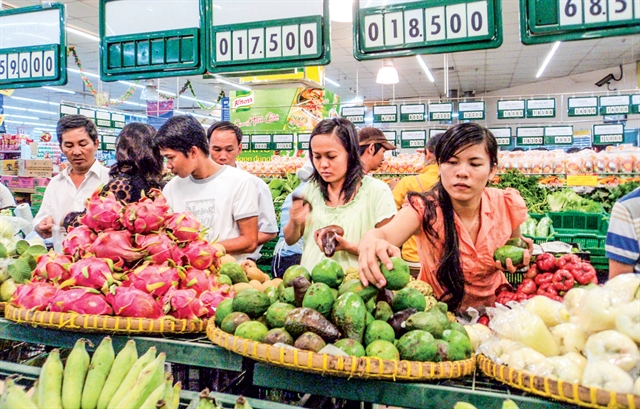With its favourable natural conditions and forward-looking policies, the southeastern province of Tây Ninh is gradually establishing itself as a key player in Việt Nam’s agricultural transformation, bridging the gap between producers and consumers of local farm products.

TÂY NINH — With its favourable natural conditions and forward-looking policies, the southeastern province of Tây Ninh is gradually establishing itself as a key player in Việt Nam’s agricultural transformation, bridging the gap between producers and consumers of local farm products.
In recent years, the province has intensified efforts to modernise its agricultural sector, aiming to increase product value, enhance competitiveness, and expand access to both domestic and international markets.
Central to this mission is a shift towards sustainable, high-tech farming aligned with market demands and environmental conditions.
Tây Ninh has proactively restructured crop and livestock systems, promoting greenhouse vegetable cultivation and farming practices certified by VietGAP and GlobalGAP standards.
These innovations are helping local farmers move away from traditional models and embrace a more resilient, productivity-focused approach.
One notable example is PACOW International Co., Ltd, located in Trảng Bàng Town. As a pioneer in chilled beef production under Australian standards, the company has invested in a fully closed-loop supply chain – from breeding and raising cattle to slaughtering and packaging.
This technological advancement not only ensures food safety but also generates stable employment for hundreds of local workers.
PACOW General Director Oàn Lộc Phến said Tây Ninh was chosen for its abundant water sources, plentiful raw materials, expansive land, and investor-friendly policies – key factors he described as favourable weather, geography and people. The firm adheres to international standards throughout the production process, reinforcing both quality and transparency.
A new mindset in agriculture
According to Nguyễn Đình Xuân, director of Tây Ninh’s Department of Agriculture and Environment, one of the most significant shifts in the province’s agricultural landscape is the evolving mindset of farmers.
In the past, agricultural exhibitions typically showcased raw products such as cassava or livestock. Today, processed items are taking centre stage – vacuum-sealed, dried or frozen goods that are convenient for consumers and better suited to retail distribution.
“Producers are becoming more proactive in adding value to their products instead of relying solely on market prices,” Xuân said.
This change is evident in the growing number of farming households and cooperatives partnering with processing firms to create commercially viable goods.
Moreover, modern machinery is increasingly present in Tây Ninh’s fields, from automatic pesticide sprayers to smart fertiliser dispensers and bio-based crop enhancers.
These tools are reducing manual labour, improving efficiency, and paving the way for a more professional and sustainable agricultural model.
Digital transformation opens new doors
A standout development is Tây Ninh’s rapid embrace of e-commerce and digital solutions.
The province is building robust value chains that connect farmers, cooperatives and enterprises, while also strengthening brand recognition for local specialties such as spiced shrimp salt, bánh tráng phơi sương (dew-wetted rice paper), and Bà Đen custard apple.
Through the national “One Commune, One Product” (OCOP) programme, Tây Ninh is enhancing product quality and packaging to increase market appeal.
Local authorities are also promoting traceability systems, enabling consumers to verify the origin and journey of their food – an increasingly important concern in the modern food industry.
Digital commerce platforms are playing a vital role in closing the distance between producers and end-users.
Farmers and producers are now creating websites and promoting their goods on social media, making it easier for consumers to access product information, pricing, and availability.
Nguyễn Thị Thu Ngân, CEO of Vạn Hoa Multimedia Co., Ltd, which operates the e-commerce site cholonghoa.com, noted that online selling has transformed how businesses reach customers.
“E-commerce helps us cut operating costs, expand our reach and increase sales efficiently,” she said. Post-COVID, consumer behaviour has further cemented online shopping as a norm, offering sustainable growth opportunities for agro-businesses.
In the food sector especially, consumers are demanding transparency regarding product origins and safety. In response, producers are attaching detailed traceability codes that track a product’s journey from farm to fork.
This not only builds consumer trust but also supports regulatory oversight in case of food safety incidents.
To sustain its momentum, Tây Ninh has designated several high-tech agricultural zones and rolled out preferential policies to attract strategic investors.
Major corporations like Hùng Nhơn, De Heus, and Vinamilk are already participating in large-scale projects, contributing to the province’s digital transformation and production efficiency.
Under the provincial development plan, Tây Ninh aims to establish 22 high-tech agricultural zones by 2025 – including 12 for crop cultivation, seven for livestock, and three integrated zones.
Each zone will be supported by at least one production-consumption linkage, with a goal to produce over 25 per cent of agro-forestry-aquatic output through cooperative and value-chain models by 2025, rising to 35 per cent by 2030.
As Tây Ninh continues to innovate and connect producers more closely with consumers, the province is setting an example of how technology, policy and market insight can converge to reshape Việt Nam’s agricultural future. — VNS





